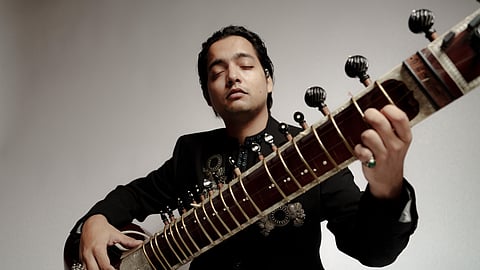Sitarist Mehtab Ali Niazi on his recent track 'Roshan'
The young sitarist Mehtab Ali Niazi hails from the renowned Bhendi Bazar gharana. Initiated into the world of Sitar by his father, the accomplished Sitar player Ustad Mohsin Ali Khan, Mehtab commenced his musical journey at the tender age of 4. Guided by his father and grandfather, Ustad Wazir Ali Qadri, a distinguished harmonium player of the Bhendi Bazaar gharana, Mehtab made his debut performance at the age of 6 during Pandit Birju Maharaj Ji's birthday celebration, leaving the audience astounded. As the 25-year-old released his new track Roshan, we speak with him to know more about the track and his musical journey. Excerpts:
Tell us about your new track. What makes it so special and different?
Since my childhood, I had been heavily influenced by my uncle Roshan Ali Niazi. Spending countless hours watching him play the santoor, I wanted to follow his footsteps. Although my father steered me towards sitar, my bond with my uncle remained strong until his passing in 2019. Naming the song Roshan is a way of honouring his legacy and the love we shared.
Roshan is more than just a song. It's a tribute to my late uncle, who was a guiding light in my musical journey.
How do you contemporarise your instrument yet maintaining the sanctity of Indian music?
Well honestly it’s like maintaining dual personalities because both of these forms are important. While playing an Indian classical concert I need to keep in mind that I am representing the last six generations of legendary forefathers who were celebrated musicians. While playing the contemporary form I have to remember the new age audience I have to cater considering today’s modern times.
How do you plan to make classical music popular among younger generations?
Well, I have been doing it by playing around things that the younger generation is into now. On my Instagram page, I make interesting videos playing sitar on famous pop tracks wearing modern clothes so that the generation gets to know our music is also capable of doing such modern things.
Roshan is a collaborative project. How did you choose your companions for the project?
I am glad each one of them who worked on Roshan with me is my close friend, be it Ishaan Ghosh on the tabla, Noor Parmar doing the music production and Ashutosh Joshi being the cinematographer. It’s not about choosing them for the work but rather working with friends.
What is your daily riyaaz regimen?
Nowadays, with all travel and commitments, it is not as much as it used to be but I try to maintain at least 2-3 hours daily practice.
How do you curate live performances?
Curating a live performance mostly depends on the audience I am playing for. If I am playing for a younger audience, I play short multiple pieces whereas performing for a mature audience would be lengthy raagas and more soothing improvisations.
Upcoming projects?
I have a couple of upcoming tracks that I am excited about, in one of those I am planning on doing an underwater shoot, it will be tricky but can be impressive!
What in music attracts you the most?
Being able to put a smile on somebody’s face is what I love the most in music.
Do you want to be labelled as a Indian classical musician, since you play an Indian musical instrument?
I would rather be called an Indian musician playing different genres, or perhaps, an Indian global musician.

